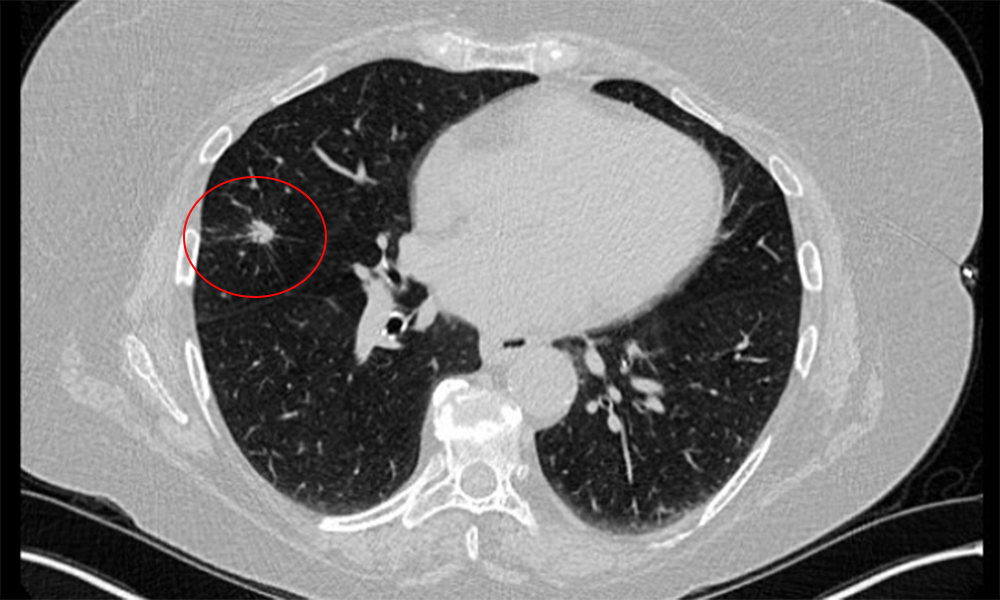Norton Cancer Institute enrolling patients for gotistobart (ONC-392) Phase 3 trial
Norton Cancer Institute is enrolling metastatic lung cancer patients in a Phase 3 clinical trial to test a promising new anti-CLTA-4 antibody, gotistobart (ONC-392). The study will test whether gotistobart is more effective than the [...]
View moreDiagnosing early stage lung cancer with robotic bronchoscopy lung nodule biopsy
The patient A 67-year-old woman with a past medical history of chronic obstructive pulmonary disease and emphysema presented with a spiculated right upper-lobe nodule that was previously 8 millimeters in size on CT scan of […]
View moreLung cancer screening guidelines
The U.S. Preventive Services Task Force updated its lung cancer screening guidelines in 2021 to include younger patients and those who smoked less than the previous recommendation. The current USPSTF lung cancer screening guidelines are [...]
View moreLate-stage lung cancer diagnoses weigh heavily on the socially disadvantaged
As a medical oncologist at Norton Cancer Institute, I’ve seen remarkable advances in how we treat lung cancer. Lung cancers caught early can now often be successfully treated. Unfortunately, Kentucky has a massive lung cancer [...]
View moreNatural killer cell leukemia trial underway
A human Phase 1 immunotherapy clinical trial is underway using natural killer cells, or NK cells, to target relapsed or refractory acute myeloid leukemia. Acute myeloid leukemia patients who have exhausted other treatment options are [...]
View moreWhen to consider genetic testing for breast cancer
At some point in their life, 1 in 8 women will develop breast cancer. Approximately 20% of breast cancer cases are familial, affecting two or more women in the same family, usually at a later […]
View moreBenefits of ultrasound-guided fine needle aspiration biopsy
Fine needle aspiration (FNA) can provide a timelier evaluation of neck masses than open biopsy, thus saving time, money and potentially improving health outcomes with earlier diagnosis and treatment. Fine needle aspiration for head and […]
View moreLutetium Lu 177 dotatate available for advanced neuroendocrine tumor treatment
Norton Cancer Institute is the only site in Louisville offering lutetium Lu 177 dotatate (Lutathera), a second-line treatment targeting advanced-stage neuroendocrine tumors in adult patients. The drug is indicated when a patient starts to lose [...]
View moreGastric cancer red flags
The prognosis for gastric cancer is closely tied to the stage of the diagnosis. When found early, gastric cancer has a better survival rate. “Given the difference early diagnosis can make, it’s important that clinicians [...]
View morePaul A. Tennant, M.D., joins Norton Cancer Institute
Paul A. Tennant, M.D., has joined Norton Cancer Institute as a head and neck surgical oncologist. He treats complex benign and malignant conditions of the head and neck. Dr. Tennant sees patients at Norton Cancer […]
View moreGilteritinib and venetoclax regimen yields encouraging results against FLT3-mutated AML
A new regimen of FMS-related tyrosine kinase 3 (FLT3) inhibitor gilteritinib and venetoclax was tolerable at standard doses and produced high response rates for advanced, FLT3-mutated acute myeloid leukemia (AML) in a multicenter Phase 1 [...]
View morePSMA PET scan is catching cancer earlier and with greater accuracy than ever before
Accurate imaging is a crucial component of prostate cancer management for a number of reasons, including tumor localization, disease staging and detecting recurrence. Prostate-specific membrane antigen positron emission tomography (PSMA PET) scans offer an imaging […]
View more











